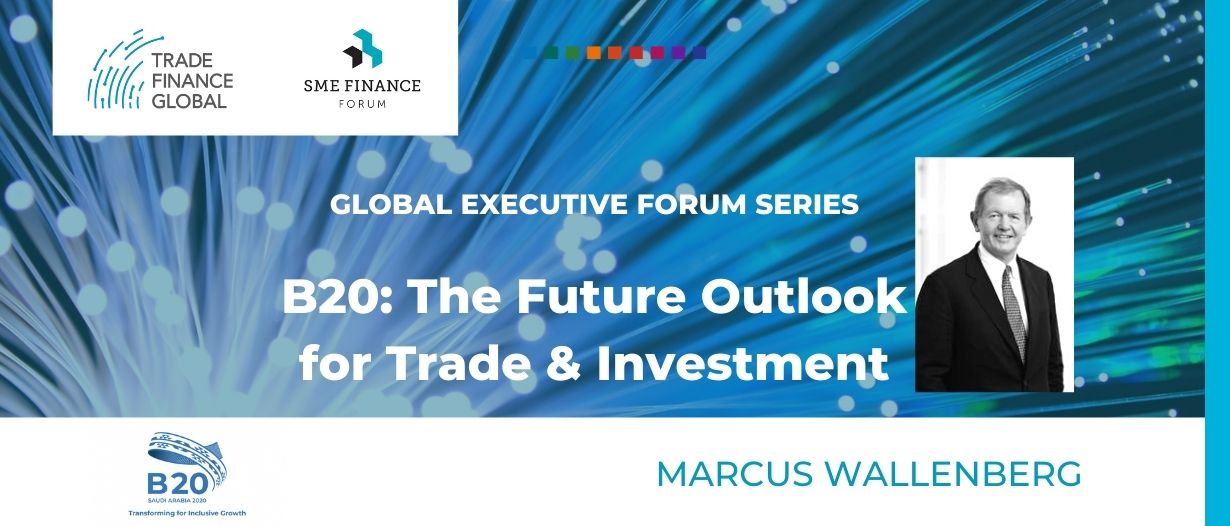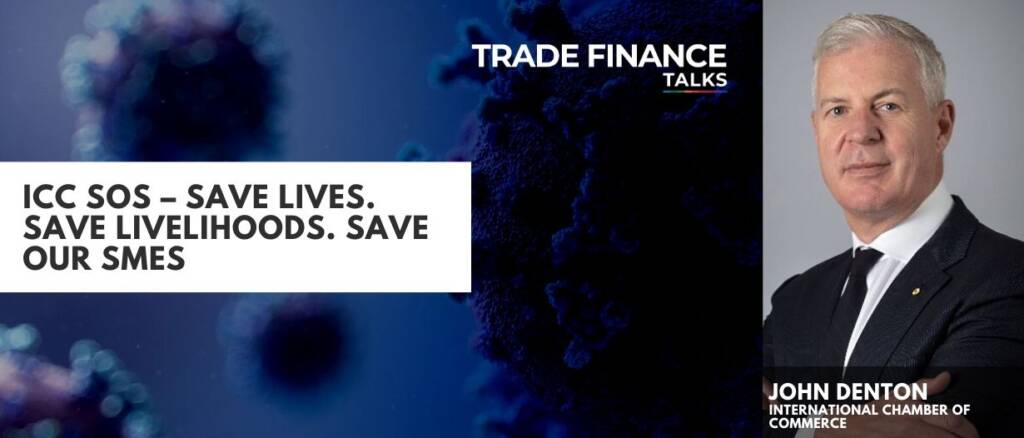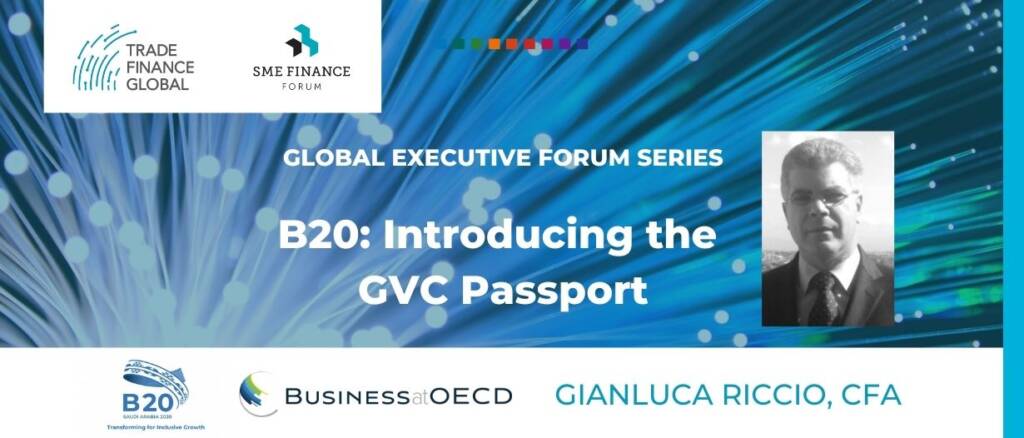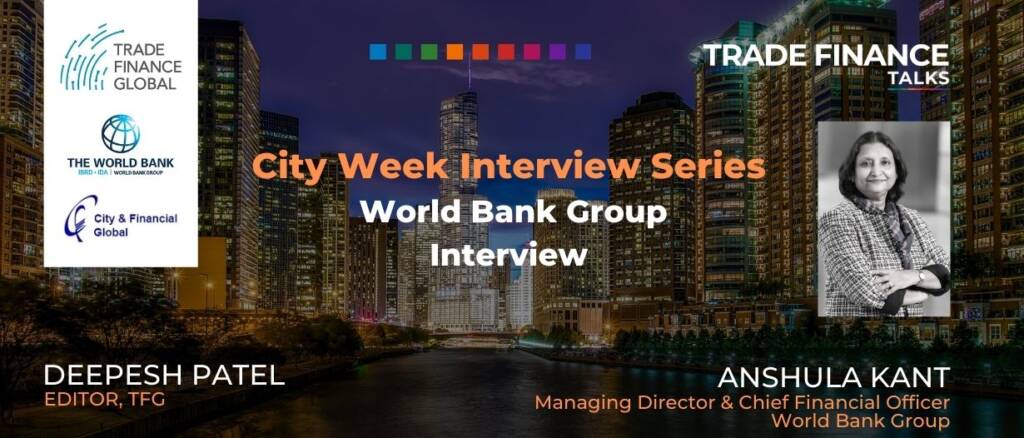What is the role of Business 20 group, and how does this voice feed into the G20? TFG spoke to Marcus Wallenberg, Co-Chair of the Trade & Investment Taskforce at B20 Saudi Arabia, one of six specialised taskforces, on the future of trade in the form of e-commerce and sustainable trade, as well as the need for concerted, coherent and multilateral action during the current COVID-19 pandemic.
Featuring: Marcus Wallenberg, Chair of SEB and Co-Chair of the Trade & Investment Taskforce at B20 Saudi Arabia
Host: Deepesh Patel (DP), Editor, Trade Finance Global
The Global Executive Forum series is a joint collaboration between Trade Finance Global and SME Finance Forum, managed by IFC.
The Role of the Business 20 (B20)
Deepesh Patel (DP): Thank you so much for doing this with us! Can you provide an overview of the B20 Saudi Arabia and the Trade & Investment Taskforce’s work?
Marcus Wallenberg (MW): The Business 20 group is assembled annually and consists of leading businesses from G20 and other invited countries. The group acts as the voice of the global private sector to the G20, developing policy recommendations that are presented to the world’s most powerful leaders to be considered for inclusion in the G20 communiqué. When Saudi Arabia assumed the presidency of the G20, the B20 adopted as its motto “Transforming for Inclusive Growth” – through our work we have aimed to deliver an impactful and differentiated policy development process, while reinforcing and sustaining the critical role of the global business community.
The Trade & Investment Taskforce is one of the B20’s six specialized taskforces. Throughout our combined decades of international business experience and many discussions over the last months, the taskforce’s 131 members have seen that more than ever before there is a need for concerted, coherent and multilateral action among nations to protect the open trade system that is at the core of global growth. The pandemic has shown us the importance of looking to the future of trade in the form of e-commerce and sustainable trade to remain agile and prosperous, and our economies depend on the efficient and reliable cross-border flow of goods and service, especially as we continue to prioritize economic recovery post-first wave. It is the B20’s duty to work with G20 leaders to ensure the business community’s perspective is part of the policy-formulation process on trade, particularly as the WTO moves to elect its next leader, define its new vision and double down on a predictable and functional multilateral trading system.
To that end, the Trade & Investment Taskforce, along with the B20’s other taskforces, are finalizing our B20 Summary Recommendations to be shared with the G20 Heads of Government and State for consideration and potential inclusion in their final communiqué. The priority areas for these recommendations are reforming and strengthening the multilateral system, creating a new level playing field for e-commerce, facilitating trade in services and promoting trade finance, and developing actions to make trade and investment in the tourism and travel-related sectors more sustainable.

MSMEs – At the heart of the economic crisis
DP: How can the global business community work together to level the playing field for e-commerce, particularly for micro-, small- and medium-sized enterprises in emerging markets?
MW: Micro-, small- and medium-sized enterprises (MSMEs) are at the heart of the economic crisis, and especially in emerging markets. The sharp fall in economic activity has affected them disproportionately compared with larger corporations, which often have more diversified supply chains and are financially more resilient. Even pre-COVID, it had become increasingly difficult for MSMEs to navigate the complexities of the current geopolitical and regulatory landscape, and now the OECD estimates around 50% of MSMEs might not survive the coming months of suspended production and reduced consumer demand. E-commerce is a promising solution to many of these challenges, but uneven access to digital infrastructure, complex national data and consumer protection rules, and the potential sale of counterfeits and other infringements all pose major threats to its successful implementation for MSMEs.
It will be crucial the business community ensures the push for e-commerce is attentive to the needs of MSMEs, particularly from emerging markets, and shares best practices with MSMEs on trade, investment and economic diversification, especially in industries which have been hard hit by COVID-19. While knowledge-sharing is key to empowering MSMEs, it is also important these businesses have access not only to groups like the B20, but beyond, including the WTO, through regular consultative mechanisms. For instance, in May, the WTO Informal Working Group on MSMEs published a statement vowing to work together to facilitate trade, accelerate efforts towards trade digitalization and improve MSMEs’ access to trade finance and to trade-related information through online platforms. A common set of rules to create a sound e-commerce policy environment will also be immensely helpful to MSMEs looking to enter or grow within the e-commerce industry, establishing a common framework for enablers of e-commerce, protecting businesses small and large and reducing administrative burdens in the form of dispute settlements, contract law and others.
The Global Value Chain (GVC) Passport
DP: What is the joint B20-OECD vision for the recently launched GVC Passport program?
MW: In early September, B20 Saudi Arabia partnered with Business at OECD (BIAC) on a joint policy proposal with the goal of creating opportunities for MSMEs to take part in the global trade system through innovative technology like blockchain and artificial intelligence. MSMEs represent 90 percent of business and 50 percent of employment worldwide, and their ability to innovate and act quickly will be a critical factor of jumpstarting and reopening the economy, driving competitiveness and putting countries back on a path for sustainable growth.
The proposal calls for the establishment of a Global Value Chain (GVC) Passport to allow MSMEs incorporated in one country to operate legitimately in other participating countries, effectively removing geographic barriers and bureaucratic processes and bringing these businesses into the 21st century. It would provide an authenticated, authoritative, verifiable financial fingerprint of a given entity, enabling it to operate within GVCs without the need to reproduce the same documentation on multiple occasions – a major barrier to growth for MSMEs with limited access to resources. This initiative will be especially impactful in emerging economies, where these businesses deliver on average more than 33% of GDP. With the dramatic impact of COVID-19 on global trade, we along with BIAC believe this is the right time to advance this concept and help economies get back on track.
Sustainable Global Trade: Digitalization and E-Commerce
DP: What is the B20’s vision for a sustainable global trade system and what role does digitalization and e-commerce have to play in this vision?
MW: Business, and therefore trade and investment, has a pivotal role to play in achieving the Sustainable Development Goals by 2030 – the SDGs are one of the B20’s cross-cutting themes and each of our recommendations have been closely aligned with the goals. To realize the ambition of reaching our goals by 2030, however, it is crucial the global business community enables companies in developing and least developed economies to integrate themselves into and derive the benefits from the multilateral trade and investment systems.
To exploit the economic development potential of trade and investment while also protecting the planet, G20 countries must combine long-term capacity building in emerging markets with a greater focus on the contribution of trade to climate change mitigation. That will require diversifying national economies and avoiding new tariff and non-tariff barriers in the pursuit of environmental objectives.

Central to the transforming power of e-commerce is a strong digital infrastructure in developing economies and least developed countries, which will be crucial in two ways for the sustainable future of the global trade system. First, digitalization and thus e-commerce will create an opportunity for economic diversification for businesses of all sizes, which will be baked into future trade and investment agreements and act as a catalyst to a more sustainable future. Second, improving access to digital tools will ensure a more inclusive and less-costly system, improving access to trade finance and to trade-related information to businesses that need it most such as MSMEs and entrepreneurs.
The global trade system of the future must be a sustainable one – we must ensure it is also accessible and that businesses both large and small have access to the technology to cement their role in the global push for a green recovery. Only through meaningful transformation and inclusive growth will our current system of trade and investment become fit for the future.






























